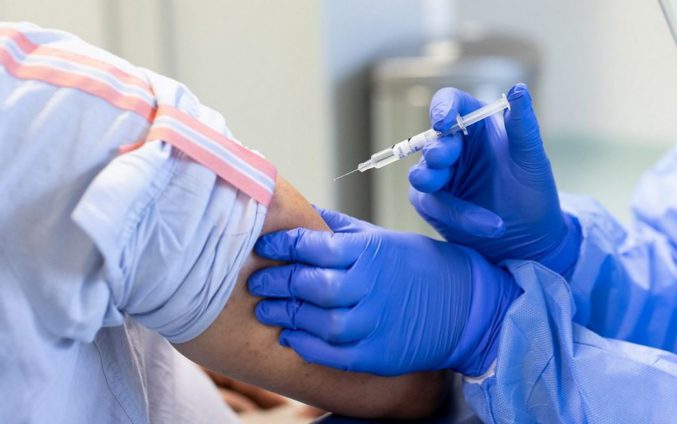The West African Centre for Cell Biology of Infectious Pathogens (WACCBIP) and GIZ have organised a forum on vaccine research, development, and manufacturing in Ghana.
The event took place at the WACCBIP Conference Hall at the University of Ghana on Friday, June 7.
The forum aimed to discuss how Ghana can establish structures to produce vaccines and prepare to respond to emerging pathogens.
Speaking at the event, the CEO of the National Vaccine Institute, Professor William Ampofo, noted that during the COVID-19 pandemic, the country initially lacked vaccines.
This highlighted the need for Ghana to develop its own manufacturing capacity and engage in research and development to produce vaccines domestically.
Prof. Ampofo assured that the National Vaccine Institute would fully support efforts geared towards the production of candidate vaccines that the private sector could scale up for manufacturing.
"When we did the assessment as a presidential committee, we realised that - sometimes the impression is given that nothing is happening, but actually, a lot is going on in the research institutions in academia.
"My group produces what we call Influenza Antigens, which are circulating our shares with the WHO group and actually influence the decision on the type of influenza vaccine that is made here."
He also noted that Ghana was one of the few countries that continued to share influenza antigens during the COVID-19 pandemic, adding that the country's work in various programs significantly contributes to global efforts.
“We will continue to push the government to commit resources; already some resources have been made available to support research and development," he said.
He acknowledged the support from the European Union and GIZ, emphasising their backing for the presidential committee and the National Vaccine Institute.
In his keynote address, the Country Director of GIZ, Dr Dirk Aßmann, highlighted the importance of vaccines in saving lives.
He stated that the development of vaccines against major diseases has helped reduce child mortality by 40% worldwide and by more than 50% in Africa.
“Pandemics, such as the recent COVID-19, have been kept under control through vaccination," he said.
Dr Aßmann emphasised that vaccine production is crucial for global security and offers significant opportunities for economic growth.
He noted that the government recognizes this and is keen to turn Ghana into a vaccine manufacturing hub in the sub-region.
He stated that vaccine production could be advanced in the country through research and development, noting that the German Development Cooperation and the European Union are working with the National Vaccine Institute and research institutions such as WACCBIP to strengthen local producers of pharmaceutical products and connect industries both nationally and internationally.
Postdoctoral Research Associate at WACCBIP, Dr Irene Owusu-Amoakoh, speaking on the immune response to SARS-CoV-2 after vaccination and natural infection, said that although the World Health Organisation has declared the end of the COVID-19 pandemic, this does not mean the virus has been eliminated.
She said that during the pandemic, vaccines played an important role in reducing the severity of infections.
However, she noted there is no specific timeframe to determine how long the vaccine's protection lasts, even with exposure to SARS-CoV-2.
Dr Owusu-Amoakoh shared preliminary data showing that SARS-CoV-2 neutralising antibodies can persist for up to 20 weeks in people who are vaccinated and infected.
For those who were not infected or showed no symptoms but were vaccinated, neutralizing antibodies against Beta and Omicron variants could persist for up to eight weeks.
She clarified that neutralising antibody assessment is a good measure of successful vaccination, as vaccinated individuals are more likely to express neutralising antibodies.
Latest Stories
-
Ghana Music Awards Europe adds ‘Best Political Song’ category to 2025 edition
56 minutes -
Azumah Resources refutes claims of selling Black Volta Gold Project
1 hour -
GFA boss Kurt Okraku appointed President of CAF Inter-Club Competitions
1 hour -
More HIV patients not on treatment – New report reveals
3 hours -
NSMQ 2025: A deep dive into Bono, Bono East and Ahafo schools eyeing national glory
3 hours -
Ibrahim Mahama donates GH¢50k to Suzzy Pinamang after funding life-saving eye surgery in UK
4 hours -
NSMQ 2025: Obiri Yeboah SHTS secures 3rd spot in Central Regional qualifiers
5 hours -
NDC Canada chapter applauds Gyakye Quayson’s appointment as deputy Minister for Foreign Affairs
5 hours -
Marie Kore International Tournament set to ignite Rugby fever in Abidjan
5 hours -
Ayisi treats fans to intimate performance in Accra following TGMA win
5 hours -
11 inmates of Manhyia Local Prison trained in batik, tie and dye craftsmanship
5 hours -
President of Rugby Africa Herbert Mensah arrives in Uganda ahead of the RAC2025
5 hours -
Inlaks wins Banking Technology Provider of the Year; Yacoba Amuah wins Outstanding Woman in Tech at DIA Awards
5 hours -
GTA launches 2024 Ghana Tourism Report in Accra
5 hours -
NSMQ 2025: Nyakrom SHTS crushes competition in silent but dominant NSMQ performance
6 hours

